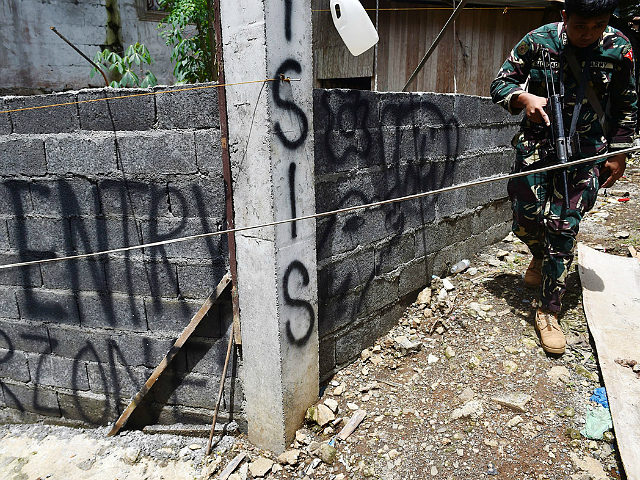Militants allied with the Islamic State (ISIS) reportedly looted a fortune in cash, gold, and jewelry from the Philippine city of Marawi during their five-month occupation last year, and have used their booty to recruit hundreds of new terrorist operatives.
Although its ambitions to use Marawi as the capital of a new caliphate were thwarted, ISIS has grown strong enough to battle Philippine troops again over the weekend.
According to Reuters, the key figure in the Islamic State’s Philippine comeback is an insurgent named Humam Abdul Najib, a.k.a. Abu Dar. Najib was able to slip out of Marawi after it was recaptured by Philippine forces in October with treasure stolen from banks, businesses, and residences in the city. Money was also raised by taking hostages for ransom. Some of the hostages report seeing militants use explosive devices to crack open bank vaults.
Marawi City police supplied an additional detail to the ISIS looting spree: the occupation began shortly before the Muslim holiday of Ramadan, so the largely Muslim residents of the city had more money on hand than they usually would because gifts of money are a local Ramadan tradition. The thieves were overheard proclaiming their loot was a “gift from Allah.”
Najib used these funds to recruit both impoverished Filipino youths and hardened mercenary troops. His recruiting drive was successful enough to replace many of the hundreds of militants lost in the battle for Marawi.
“Definitely they haven’t abandoned their intent to create a caliphate in Southeast Asia,” warned Col. Romeo Brawner of Joint Task Force Marawi. “That’s the overall objective, but in the meantime, while they are still trying to recover and build up again—fighters and weapons—our estimate is they are going to launch terrorist attacks.”
The first of these attacks appears to have occurred on Saturday, as government forces clashed with small squads of the ISIS-allied Maute terrorist group. The Philippine military expressed concern that ISIS terrorists have become adept at surviving in the wilds of the restless island of Mindanao and have forged connections with the impoverished local population.
Hopes that ISIS in the Philippines would collapse with the death of local strongman Isnilon Hapilon were quickly dashed. As far back as November, the many other militia groups in Mindanao, including some Muslim fighters, were bracing themselves for battle with the Islamic State and warning that ISIS recruiters were active in their communities.
Some said the Islamic State’s defeat in Marawi was less important than the impressive length of time they were able to hold off Philippine government forces, which inspired more feuding Islamist bands to rally under the ISIS banner. Presumably, the militants were even more impressed by vans and trucks overstuffed with money and jewelry rolling out of Marawi during the occupation.
Mindanao remains under martial law, as it has been since the siege of Marawi began last May. President Rodrigo Duterte’s office put out a call for foreign assistance on Monday, even as opposition politicians criticized the intensive American assistance provided during the Marawi crisis.
“We ask help from anyone, from all countries of the world, because the threat of terrorism is not just in the Philippines, it’s a worldwide concern. So if countries want to give whatever assistance they could and they want to, it’s welcome,” a spokesman for President Duterte said, while insisting the request was not inconsistent with Duterte’s aspiration to develop a more “independent” foreign policy.

COMMENTS
Please let us know if you're having issues with commenting.